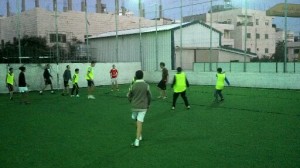Its 1:00 in the morning and thoughts of Ultimate Peace practice are keeping me awake. Namely, how does UP introduce and coach the principle of nonviolence with the burgeoning team in Bethlehem, West Bank (pictured below in their first practice of 2014).
Nearly all of the players in this particular group reside in a Bethlehem refugee camp. (Another camp nearby was in the news lately for violent clashes between Israel Defense Forces and camp residents) Without wider knowledge of individual camps’ histories, I get the initial sense that camp residents are exposed to violence in a way that even other Palestinians are not.
For example, the ultimate players in Beit Sahour a couple miles away likely experience IDF differently. Considering also that the majority of Ultimate Peace’s communities are in Israel (Jewish and Arab communities there), the conversation (in Bethlehem) about nonviolence is happening in a different setting from most others even within the organization.
So, how do we coach nonviolence in a meaningful way? What happens in this exchange between an American UP coach and the players? How is coaching on nonviolence different among players exposed to violence beyond the experience of other groups?
Where to start? Well, how about the Ultimate Peace website? Here is something relevant: “our programs are designed to focus on altering mindsets and perceptions by providing shared experiences in which recreational enjoyment, personal reflection, culturing sharing, and experiential learning are emphasized and balanced.” Source. So, how can we turn that into a practice plan?
Where to next? Well, Dr. King left a legacy of nonviolent philosophy and tactics. More heightened for me because of our shared birthplace. He posits that “the nonviolent concept is an overall effort to achieve a reconciled world by raising the level of relationships among people to a height where justice prevails and persons attain their full human potential.” Source. What can UP coaches do that leads in this direction?
This is only a starter post. I would really like to hear from you, readers. Please use the comments section below. Do you think UP’s approach to the principle of nonviolence ought to be the same in Bethlehem as in other UP communities? In general, what can we as UP bring to the conversation? And what can we expect to take away from it?


